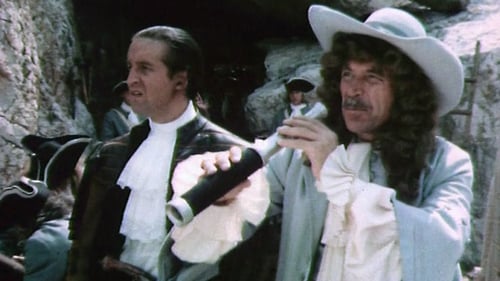
A surreal fairy tale for adult viewers, mixing animated and live performances. Wasn't finished due to budget problems.

Major Wood
After being wrongly convicted as a traitor, Peter Blood, an English physician, is sent to exile in the British colonies of the Caribbean, where he becomes a pirate.

After coming out of jail a sneak thief "Chibis" plans a big afaire.

Геннадий
Sergey meets girls at the sea that he, allegedly working in a prestigious profession (he is either a pilot, flying abroad, or an employee of Vneshtorg), easily succeeds. He is interested in a woman sitting alone on the beach with a parrot in a cage. She is not particularly inclined to get acquainted, but eagerly talks about her son - a round honors student who was even shown to a professor from the Novosibirsk Academgorodok. Here, Sergei meets a terribly impudent guy who knows who he actually works.

Baseado na obra-prima dramática homônima de 1893 do ucraniano Ivan Franko [Іван Франко]; uma fábula dos Cárpatos filmada no legado de "Sombra dos ancestrais esquecidos/ Cavalos de fogo [Тіні забутих предків]" de Paradjanov [Параджа́нов].

The film is based on the stories Anton Chekhov. It is a tribute to the actor Boris Andreyev. He plays a major role that keeps up for the duration of the film. Lively and intelligent Valery Spout largely mitigates underline the drama of the protagonist, while Michael Sveta's role, though small, is bright and memorable.

инженер

Ріхтер
The action takes place during World War II and the German occupation of Ukraine, in a small village. During clashes on the road, the village boy Vasyl, one of the local partisans, killing a German officer. The occupants take hostages and vow to execut all village inhabitants will beed, including old people and children, if the perpetrator is not found and delivered to them. The problem of choice faces the fellow villagers and Vasyl himself.
The film is striking it its black-and-white imagery unfolding not so much against, as together with, the emotionally intense music by Pederecki, Bakki, and Skoryk. Conscience is absolutely free of Soviet ideological clichés obligatory for the WWII genr, and was immediately banned by the Soviet censorship. It was first restored in 1989 by the Dovzhenko Studio and in 2011 by the Ukrainian Ministry of Culture.





